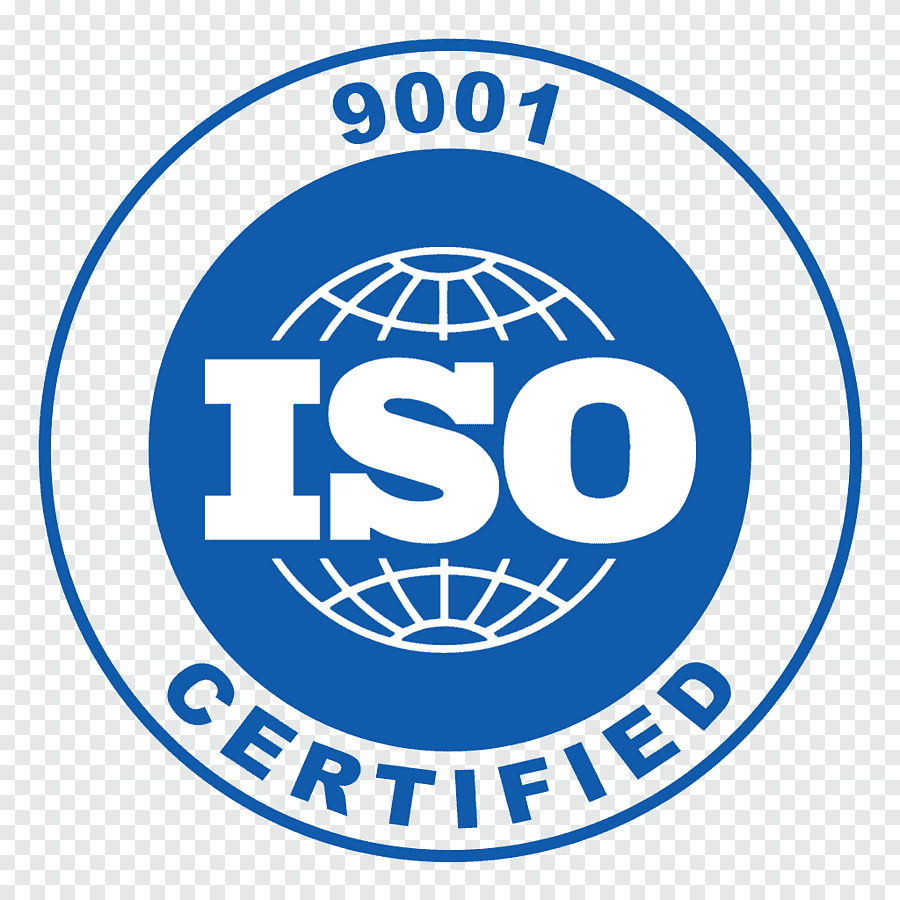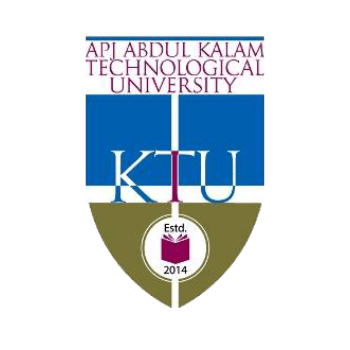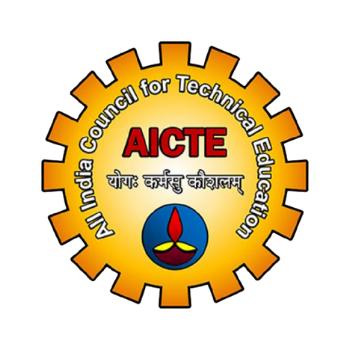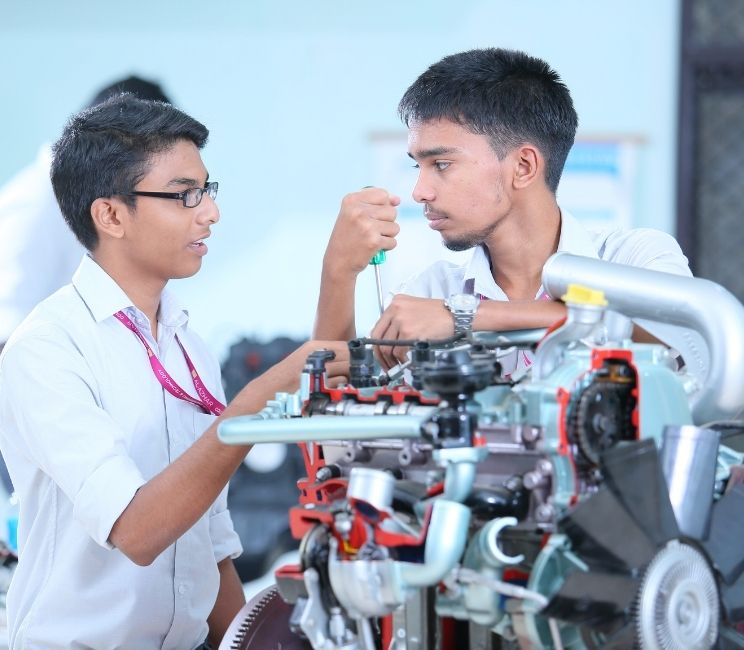Department of Automobile Engineering
Department of Automobile Engineering is established in 2015 with an annual intake of 60 students and has well-equipped laboratories which have high-end equipment and the latest CAD design and development software packages including AutoCAD, PRO-E, SOLID WORKS, and ANSYS for students to pursue their research and project work.
Automobile Engineering helps students to develop an analytical approach that cuts across various engineering disciplines. The course also offers insightful industrial visits that are designed to help familiarize students with the industry. It is also designed in a way to mobilize student participation by conducting various quiz competitions and seminars each semester. This course combines engineering fundamentals with a focus on the latest global progress in Automobile technologies. Our curriculum has been designed to develop Automobile Engineers with a strong analytical and experimental way of thinking that supports modelling, designing, and teamwork abilities.
The various training/workshops are being organized for educational personnel and student on regular basis. Extracurricular activities are also taken up by the students. Students from the various semesters are participating in national and international competitions and won prizes. The students are taking the benefits from well-equipped laboratories to enhance and update their knowledge and skill. Students also undergo project work and training at various industries and service centres during their studies.
The automobile industry in India has witnessed rapid growth over the last couple of decades and in recent years it has also captured the attention of the whole world with some innovative products. It includes manufacturing two-wheelers, passenger cars, trucks, tractors, defence vehicles and buses. It requires skilled and trained manpower with good technical knowledge. Hence there are plenty of employment opportunities for qualified automobile professionals.
VISION
To mould high-quality technical personnel with sound Automobile engineering knowledge along with upholding the finest of technical education standards and build highly competent and professional human resources in emerging automobile technologies to contribute to socio-economic development.
MISSION
To impart quality education with modern support facilities and industry-institute interactions as well as provide comprehensive knowledge on recent trends in automobile technology with multi-disciplinary approach along with to assimilate professional and emphasizing ethical values and preparing them to meet the growing challenges of the Automotive Industry
Amal Thomas
Head of Department
PROGRAM EDUCATIONAL OBJECTIVES (PEOs)
The educational objectives for Automobile Engineering program are designed to produce competent engineers who are ready to contribute effectively to the advancement of computer engineering causes and to accommodate the needs of the community. These objectives are as follows:

PEO1
Graduates with the Automobile degree in automotive function as applied knowledge specialists in the field of automobile manufacturing and new systems testing and implementation.




PEO2
Graduates with specialized background in automotive apply their knowledge of automotive theory, design and application of new systems that include interfacing new technologies into time tested current technologies.




PEO3
Graduates equipped with domain knowledge and skills in the field of automotive engineering and management, along with positive attitude
PROGRAM OUTCOME (POs)
Engineering Graduates will be able to




PO1: Engineering knowledge
Engineering knowledge: Apply the knowledge of mathematics, science, engineering fundamentals, and an engineering specialization to the solution of complex engineering problems.




PO2: Problem analysis
Problem analysis: Identify, formulate, research literature, and analyze complex engineering problems reaching substantiated conclusions using first principles of mathematics, natural sciences, and engineering sciences.




PO3: Design/development of solutions
Design solutions for complex engineering problems and design system components or processes that meet the specified needs with appropriate consideration for the public health and safety, and the cultural, societal, and environmental considerations.



PO4: Conduct investigations of complex problems
Use research-based knowledge and research methods including design of experiments, analysis and interpretation of data, and synthesis of the information to provide valid conclusions.


PO5: Modern tool usage
Create, select, and apply appropriate techniques, resources, and modern engineering and IT tools including prediction and modeling to complex engineering activities with an understanding of the limitations


PO6: The engineer and society
Apply reasoning informed by the contextual knowledge to assess societal, health, safety, legal and cultural issues and the consequent responsibilities relevant to the professional engineering practice.


PO7: Environment and sustainability
Understand the impact of the professional engineering solutions in societal and environmental contexts, and demonstrate the knowledge of, and need for sustainable development.


PO8: Ethics
Apply ethical principles and commit to professional ethics and responsibilities and norms of the engineering practice.


PO9: Individual and team work
Function effectively as an individual, and as a member or leader in diverse teams, and in multidisciplinary settings.


PO10: Communication
Communicate effectively on complex engineering activities with the engineering community and with society at large, such as, being able to comprehend and write effective reports and design documentation, make effective presentations, and give and receive clear instructions.


PO11: Project management and finance
Demonstrate knowledge and understanding of the engineering and management principles and apply these to one’s own work, as a member and leader in a team, to manage projects and in multidisciplinary environments


PO12
Recognize the need for, and have the preparation and ability to engage in independent and life-long learning in the broadest context of technological change.
PROGRAM SPECIFIC OUTCOME (PSO)
Engineering Graduates will be able to




PSO1
Design and develop the automotive system and its components with due considerations of society impact and sustainability.




PSO2
Analyze the performance of an automotive system using modeling, simulation and testing




PSO3
An ability to apply the acquired knowledge about automotive engineering for the development of society



PSO4
An ability to understand, design, applies and solves the engineering problems in Automobile sectors.
Teaching Faculty
Our faculty members are our greatest asset. Through their enthusiasm and their ability to connect easily with the students, they contribute towards the overall professional and personal growth of the students.
Amal Thomas
Phone 8883 535 081
Joining Date 1/3/2017
Roles Handled Asst. Professor (Head of The Department)
Qualification ME In Mechatronics, B.Tech Automobile Engineering, Diploma in Automobile Engineering
Experience 5 Years Experience Teaching + .9 Months Industry Experience
List of Papers Published 2
1.Performance Analysis of Thermal Barrier Coating on Piston
2. Impact Analysis on Composite Helmet by using FRC and Glass Fiber by using ANSYS
Jithin Baby
Roles Handled Asst Professor
Joining Date 25/1/2016
Amal V S
Phone 859 286 0126
Email amalvsanu@gmail.com
Roles Handled Asst. Professor
Qualification M.Tech in Thermal Power Engineering
Joining Date 1/12/2021
Kishore K Madhu
Phone 884 811 0010
Email kishorkmadhu@gmail.com
Qualification M.Tech in Thermal Power Engineering
Roles Handled Asst. Professor
Joining Date 16/12/2021
Ananthu Joshy
Roles Handled Asst. Professor
Joining Date 3/2/2022
Aswanth K
Roles Handled Asst. Professor
Joining Date 14/11/2022
Technical Staff
Nazar N N
Roles Handled Trade Instructor
Lab Facilities
Excellent infrastructure is provided for the academic betterment of our students. To substantiate theoretical expressions, Al-Azhar has established modern laboratories that comply with the KTU regulations. The equipment, specimen and technical facilities in the lab create a superior ambience for the students to conduct experiments.
Vehicle Systems Lab
- To study hand tools, special-purpose tools, and their uses.
- To familiarize with various systems and components of an automobile.
- To know about writing technical specifications and descriptions of all types of chassis and transmission components of automobiles, including body and interiors.
Auto Electrical & Electronics Lab
- To familiarize the design and construction of various automotive electrical systems. To practice fault finding and rectification of automotive electronic systems.
Autotronics Lab
- Familiarize the students with the various sensors used in Automobiles.
- Impart knowledge in designing electronic circuits in automotive systems and fault diagnostics.
Two & Three Wheelers Lab
- This lab facilitates practices for servicing and repair the two and three-wheeler engine, Chassis, sub systems and the Performance of Shock absorber
Automobile Engineering Lab
- This lab facilitates and enables students to understand the fundamentals of Automotive Engineering which include basic structure, body style, power plant and wheel & tyre assembly.




ISO 9001:2015 certified Institution


Affiliated to A.P.J Abdul Kalam Technological University


Approved by All India Council for Technical Education
Call
Office 0486 222 79444
Principal 9746 144 555
Admission 9496 911 119





